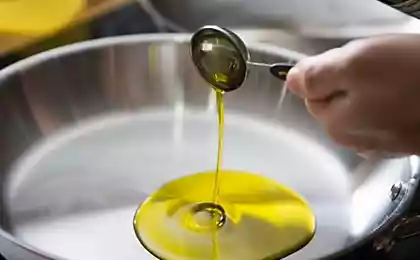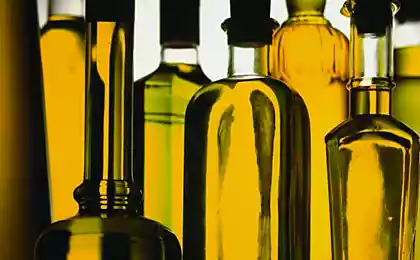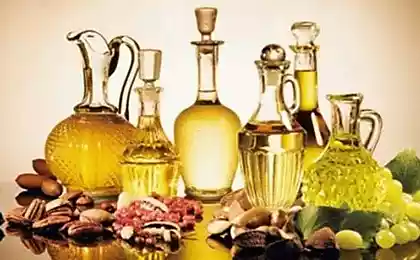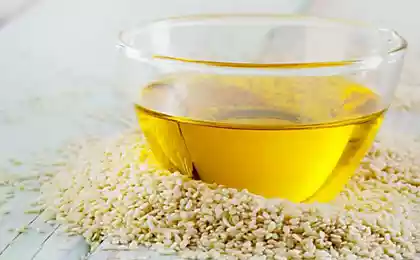563
What kind of oil to use for cooking is STRONGLY NOT recommended
Today we will talk about the carcinogens in fried in oil products.
Carcinogens — chemical substances whose effects on the human or animal body increases the likelihood of malignant neoplasms (tumors), or it leads to him.
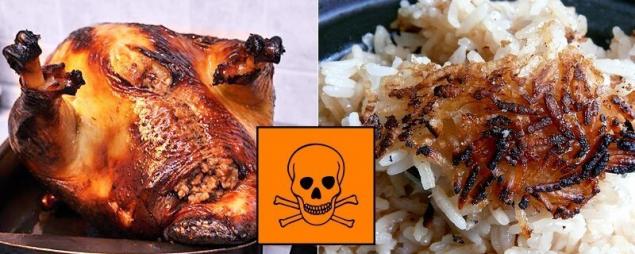
Toxic, carcinogenic and simply harmful substances in the oils are formed in two cases:
"Dymlenija temperature" is the temperature at which oil starts to smoke in the pan, from this point on in this run the reaction for the formation of toxic and carcinogenic substances. Each variety of oil has its own temperature dymlenija. Generally, all oils are divided into oil with a high temperature of dymlenie and low temperature dymlenija.
Oils with a high temperature of dymlenija it is recommended to use for frying, in particular, for deep-frying. The refining process raises the temperature of dymlenija. Oil with low temperature dymlenija to use for frying is not recommended. Lead temperature dymlenija some oils.
Oils with a high temperature of dymlenija:
Toxic substances produced by heating or rancidity of oils and ways to avoid them education
Let's take a closer look substances that are formed during strong heating of the oils and their rancidity.
Acrolein is the aldehyde of acrylic acid belonging to the group tear toxic substances. Owing to its high reactivity the acrolein is a toxic, strongly irritating the mucous membranes of the eyes and respiratory connection.
Acrolein is one of the products of thermal decomposition of glycerol and fat-glycerides. The formation of acrolein begins immediately when the oil temperature dymlenie, that is, in the beginning of burning oil. I think we all peeking eyes when burning oil, about such cases, they say "in the kitchen is a slut" is acrolein. Therefore, NEVER heat oils to the Smoking point!
Acrylamide — acrylic acid amide. Toxic, affects nervous system, liver and kidneys, irritates the mucous membranes. In fried or baked foods, and baked goods acrylamide can be formed in the reaction between asparagine and sugars (fructose, glucose, etc.) at temperatures above 120°C.
Simply speaking, acrylamide is formed in fried crust on starchy foods such as potatoes, doughnuts, pies, and were subjected to prolonged or high temperature frying in vegetable oil. Particularly active acrylamide is formed when frying in deep fat for a long time.
Some unscrupulous manufacturers fried foods, in order to save, use the same oil several times, continuing to roast it all new and new portions of goods. In this case, the poison is formed inevitably. Therefore, we strongly recommend to not roast at high temperatures for a long time and give up fried food.
Free radicals and polymers of fatty acids, and heterocyclic amines — actively formed in the products of dymlenie and burning. Amines are very toxic substances. Dangerous as inhaling their vapours and contact with skin.
Polycyclic substances with high carbon content (corona, chrysene, benzpyrene, etc...) — are powerful chemical carcinogens, and are also formed in the products of dymlenie and burning. For example, benzpyrene, which is a chemical carcinogen first class of danger. Formed during the burning of products: grains, fats, contained in smoked products, too, is present in the smoke, the substances obtained by burning resins.
The Commission regulation EC No. 1881/2006 from 19.12.06 determines that in vegetable oils and fats should contain less than 2 micrograms of benzpyrene per 1 kg; smoked products to 5 mg/kg; in grains, including in baby food, up to 1 mg/kg. Attention! In some cases, such as in overcooked meat cooked in the barbecue over charcoal, may be contained to 62.6 ág/kg benzpyrene!!!
When rancidity of oils are formed mainly aldehydes, epoxides and ketones.Interacting with oxygen when exposed to light and heat, the oil changes its taste and smell. For fats, which are dominated by saturated fatty acids, characterized by the formation of ketones (ketone rancidity) of fats with a high content of unsaturated acid — aldehydic rancidity.
Ketones — toxic. Have an irritating local action and enter the body through the skin. Separate substances have carcinogenic and mutagenic effect.
Aldehydes — toxic. Able to accumulate in the body. In addition to General toxic, have an irritating and neurotoxic effects. Some have carcinogenic properties.
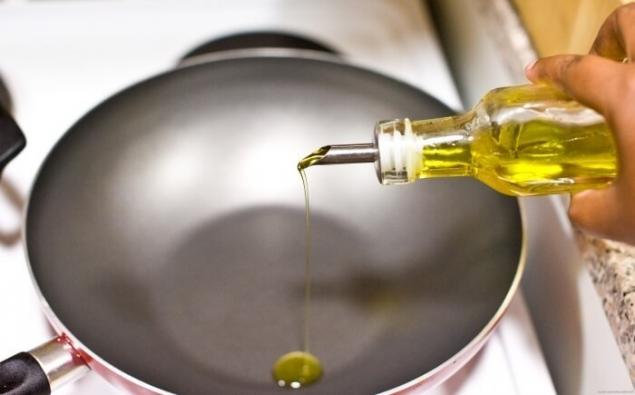
So, friends, if we do not get to exclude fried foods from the diet, pleasecook properly, based on this article and follow these simple tips:
1. Do not bring the oil up to temperature dymlenija;
2. Eliminate prolonged roasting in oil, such as deep-fried. If fried, do not use one batch of oil several times;
3. Not perezhivajte products. Remember that in burning products contain toxic substances and carcinogens;
4. For frying choose only refined oils and fats with high temperature dymlenija;
5. Store the oil in accordance with the instructions indicated on the label and do not eat rancid butter.
As the sugar industry has bribed scientists and dumped the blame on fats,Fake eggs from China: how to do it and how to spot a fake
P. S. And remember, only by changing their consumption — together we change the world! ©
Source: hrumburum.ru/post/42
Carcinogens — chemical substances whose effects on the human or animal body increases the likelihood of malignant neoplasms (tumors), or it leads to him.

Toxic, carcinogenic and simply harmful substances in the oils are formed in two cases:
- When heating oils to a temperature of dymlenie and above;
- In the rancidity of oils.
"Dymlenija temperature" is the temperature at which oil starts to smoke in the pan, from this point on in this run the reaction for the formation of toxic and carcinogenic substances. Each variety of oil has its own temperature dymlenija. Generally, all oils are divided into oil with a high temperature of dymlenie and low temperature dymlenija.
Oils with a high temperature of dymlenija it is recommended to use for frying, in particular, for deep-frying. The refining process raises the temperature of dymlenija. Oil with low temperature dymlenija to use for frying is not recommended. Lead temperature dymlenija some oils.
Oils with a high temperature of dymlenija:
- Peanut — 230°C
- Grape seed — 216°C
- Mustard — 254°C
- Corn oil refined — 232°C
- Sesame — 230°C
- Olive extra virgin—191°C
- Olive to 190°C
- Palm — 232°C
- Sunflower refined — 232°C
- Rapeseed oil refined — 240°C
- Rice — 220°C
- Soybean, refined — 232°C
- Hazelnut oil 221°C
- Walnut oil — 150°C
- Linen — 107°C
- Sunflower unrefined — 107°C
- Pork fat — 180°C
- Creamy — 160°C
Toxic substances produced by heating or rancidity of oils and ways to avoid them education
Let's take a closer look substances that are formed during strong heating of the oils and their rancidity.
Acrolein is the aldehyde of acrylic acid belonging to the group tear toxic substances. Owing to its high reactivity the acrolein is a toxic, strongly irritating the mucous membranes of the eyes and respiratory connection.
Acrolein is one of the products of thermal decomposition of glycerol and fat-glycerides. The formation of acrolein begins immediately when the oil temperature dymlenie, that is, in the beginning of burning oil. I think we all peeking eyes when burning oil, about such cases, they say "in the kitchen is a slut" is acrolein. Therefore, NEVER heat oils to the Smoking point!
Acrylamide — acrylic acid amide. Toxic, affects nervous system, liver and kidneys, irritates the mucous membranes. In fried or baked foods, and baked goods acrylamide can be formed in the reaction between asparagine and sugars (fructose, glucose, etc.) at temperatures above 120°C.
Simply speaking, acrylamide is formed in fried crust on starchy foods such as potatoes, doughnuts, pies, and were subjected to prolonged or high temperature frying in vegetable oil. Particularly active acrylamide is formed when frying in deep fat for a long time.
Some unscrupulous manufacturers fried foods, in order to save, use the same oil several times, continuing to roast it all new and new portions of goods. In this case, the poison is formed inevitably. Therefore, we strongly recommend to not roast at high temperatures for a long time and give up fried food.
Free radicals and polymers of fatty acids, and heterocyclic amines — actively formed in the products of dymlenie and burning. Amines are very toxic substances. Dangerous as inhaling their vapours and contact with skin.
Polycyclic substances with high carbon content (corona, chrysene, benzpyrene, etc...) — are powerful chemical carcinogens, and are also formed in the products of dymlenie and burning. For example, benzpyrene, which is a chemical carcinogen first class of danger. Formed during the burning of products: grains, fats, contained in smoked products, too, is present in the smoke, the substances obtained by burning resins.
The Commission regulation EC No. 1881/2006 from 19.12.06 determines that in vegetable oils and fats should contain less than 2 micrograms of benzpyrene per 1 kg; smoked products to 5 mg/kg; in grains, including in baby food, up to 1 mg/kg. Attention! In some cases, such as in overcooked meat cooked in the barbecue over charcoal, may be contained to 62.6 ág/kg benzpyrene!!!
When rancidity of oils are formed mainly aldehydes, epoxides and ketones.Interacting with oxygen when exposed to light and heat, the oil changes its taste and smell. For fats, which are dominated by saturated fatty acids, characterized by the formation of ketones (ketone rancidity) of fats with a high content of unsaturated acid — aldehydic rancidity.
Ketones — toxic. Have an irritating local action and enter the body through the skin. Separate substances have carcinogenic and mutagenic effect.
Aldehydes — toxic. Able to accumulate in the body. In addition to General toxic, have an irritating and neurotoxic effects. Some have carcinogenic properties.

So, friends, if we do not get to exclude fried foods from the diet, pleasecook properly, based on this article and follow these simple tips:
1. Do not bring the oil up to temperature dymlenija;
2. Eliminate prolonged roasting in oil, such as deep-fried. If fried, do not use one batch of oil several times;
3. Not perezhivajte products. Remember that in burning products contain toxic substances and carcinogens;
4. For frying choose only refined oils and fats with high temperature dymlenija;
5. Store the oil in accordance with the instructions indicated on the label and do not eat rancid butter.
As the sugar industry has bribed scientists and dumped the blame on fats,Fake eggs from China: how to do it and how to spot a fake
P. S. And remember, only by changing their consumption — together we change the world! ©
Source: hrumburum.ru/post/42
Favorite songs of our EGO
Fuel from sewage pipes are our future, and it is closer than we could imagine
